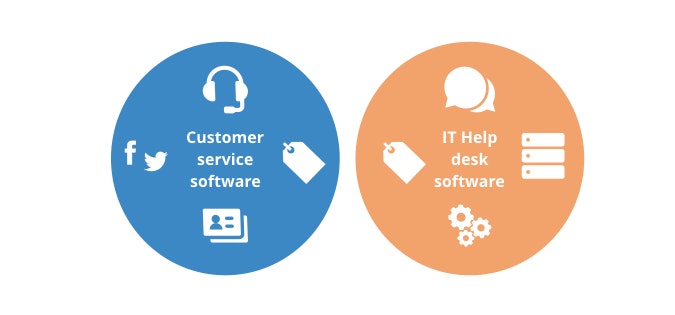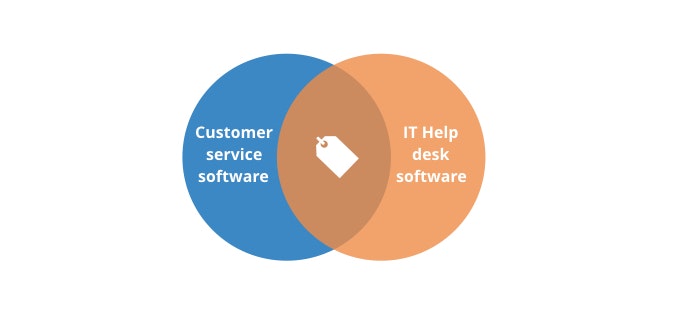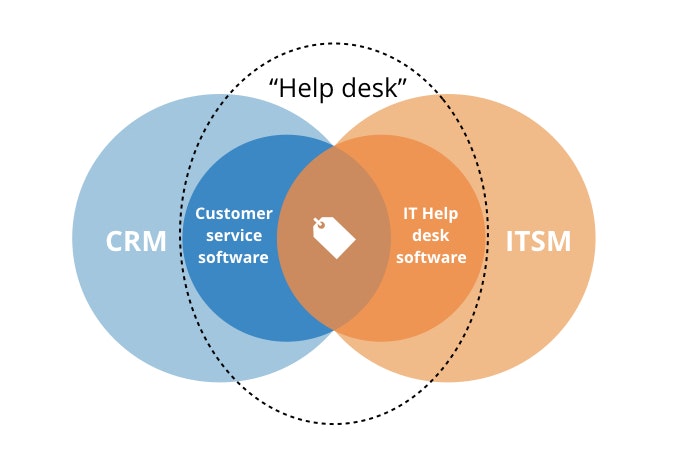What Is a Help Desk and How Is It Different From Your CRM?
“Hard,” “awful,” “painful,” “frustrating” and “minefield.”
In a CEB survey that asked thousands of executives to describe in one word their experiences purchasing software-solutions, these are the words that rose to the top.
What makes a software purchase so frustrating? The same survey found that 65 percent of customers “spent as much time as they’d expected to need for the entire purchase just getting ready to speak with a sales rep.” Most of the frustration happens in the initial research phase.
As software researchers, we can relate to this frustration. It’s in large part due to intentionally imprecise use of terminology by overeager vendor marketers. They stretch definitions to cast the widest possible nets to catch the most possible traffic online.
A case in point is the term “help desk.” The definition of help desk software has been stretched to the breaking point, where it now means anything from a customer service platform to an ITSM service desk.
Software buyers who lack a good understanding of the difference between help desk and customer service face a time-consuming, frustrating search that often leads to a poorly matched and costly software choice.
Here’s what we’ll cover:
Understand the Difference: Customer Service vs. Help Desk
Beware of Misleading Marketing Language
Return Focus to Business Goals and Challenges
Tips for Recognizing a Mistaken Purchase
Understand the Difference: Customer Service Vs. Help Desk
Customer service software (CRM) and help desk software began as two distinct genres of software, each tailored to address two distinct classes of business challenge. Customer service software focused on serving customers; help desk software focused on managing a company’s IT resources.
Customer Service Software Functionality vs. Help Desk Software

In the following table we break down the key applications in both types of software. Pay attention to the similarities in each row, as well as the differences:
| Customer Service | Help Desk |
Communications | Outward facing, call-center focused with business telephony applications like scripting and monitoring | Inward facing, focused on chat, messaging and other internal communication tools. |
Integrations | Integrated with social media channels and online consumer-focused forums | Integrated with IT management tools and configuration servers |
Database | Centers on contact management, CRM and customer histories | Centers on asset, license and configuration management |
Workflow | Uses ticketing system to track cases | Uses ticketing system to track cases |
Notice how both genres of software contain tools for communicating, integrating, managing data and tracking workflows? Software vendor marketers noticed that, too!
What Is a Help Desk?
Beginning five or six years ago, software vendor marketers saw an opportunity to cast wider nets (and capture more online traffic) by emphasizing the broad similarities between customer service and help desk software.
In particular, they latched onto “ticketing”, positioning that as a common denominator and using it to blur the lines.

And thus, a new, more amorphous genre of software was born! The generic term “help desk” took root and survives to this day, confusing and confounding many a software purchaser.
Beware of Misleading Marketing Language
As a software buyer that researches purchases online, it’s important to understand a bit about how software vendors market their products. From a digital marketing perspective, this little help-desk heist worked because:
Ticketing is core functionality in both help desk and customer service software;
It functions similarly in both, and,
Most importantly: good customer service software sales teams can still close help desk leads and vice versa.
That last point is the crux of the problem. Online, misinformation can be more profitable than information. Our advice?
Buyers should always frame their purchase decisions in terms of the specific business challenges they face. They should never frame them with the marketing terminology they’re exposed to online.
Return Focus to Business Goals and Challenges
Let’s return to the last graphic above. Here we’ve added in the correct context with the two outside circles. Customer service software is actually in the realm of customer relationship management (CRM). IT help desk software is actually in the realm of IT services management (ITSM).

You can see here how the term “help desk” leads both types of buyers astray. By focusing on their specific business challenges—such as whether they are related to customer service or IT needs—buyers can maintain perspective and avoid purchasing the wrong software.
Tips for Recognizing a Mistaken Purchase
We get dozens of calls a day from companies needing to replace their customer service software with IT help desk software and vice versa. Not to be pitied- these companies are actually far ahead of their competitors who continue using mismatched software.
The sad reality is, most customer service and IT help desk platforms are flexible enough to be forced into place, even places they don’t belong.
Sure, IT help desk software can be used to manage a customer service department. But managing customers as if their IT assets comes at a cost. It’s a cost that can remain hidden, however, so here are some indicators to look for:
User interfaces that don’t match actual request handling terms and processes
Agents forced to use many “workarounds” for even simple requests
An inability to quickly make changes to processes and workflows
Low customer satisfaction and high agent turnover
If you’ve come to the realization that you’ve been using the wrong software all along, don’t despair! And don’t immediately assume a costly full-platform replacement is immediately necessary.
Sometimes, one-off standalone applications can patch the holes while you work towards a better long-term solution. Give our advisors a call and we’ll help you weigh your choices. We’re very skilled at cutting through the marketing language … that’s what we do!